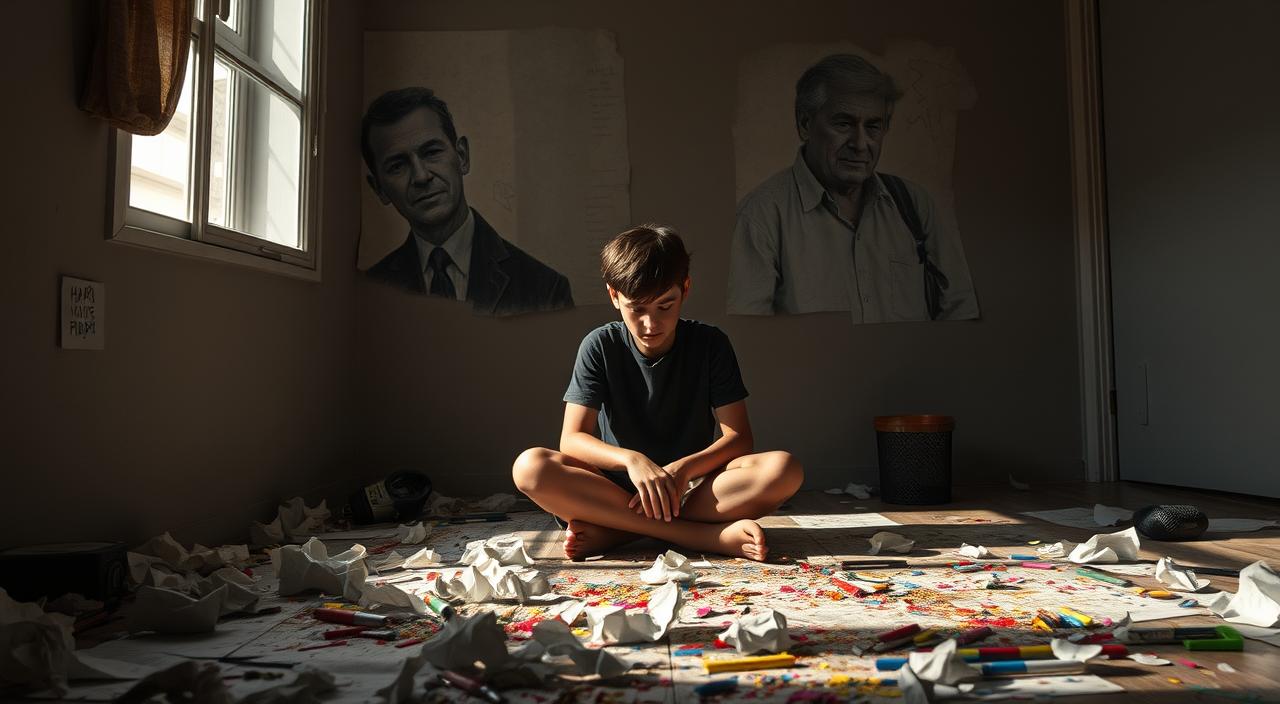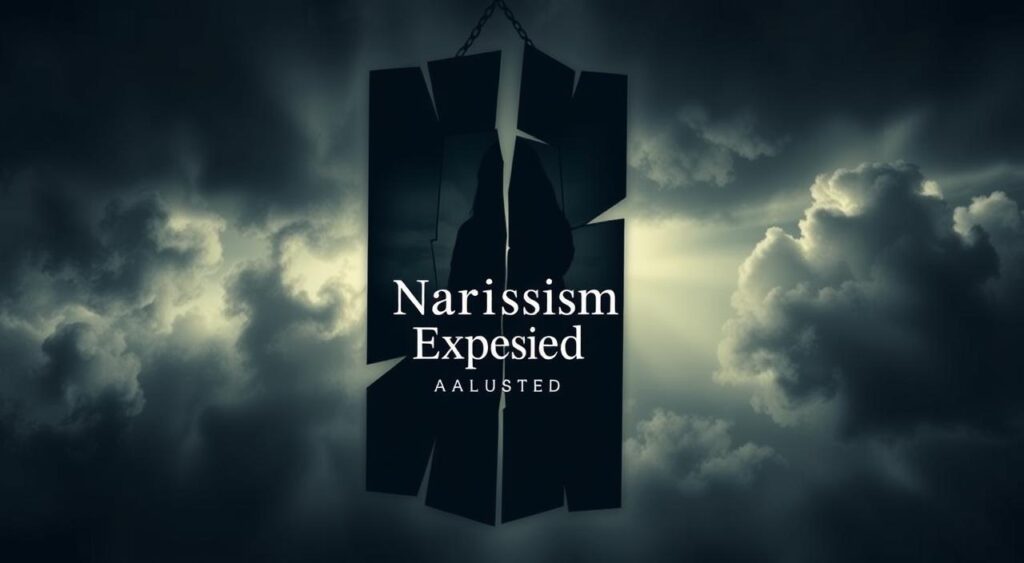Watching a parent go through domestic abuse is very hard for a child. I’ve been through it myself and felt the deep fear, loneliness, and helplessness. The emotional abuse my mom faced was a constant pain, making me feel trapped and powerless1. But, I’ve found out you don’t have to go through it alone. There are people and places that can help you get through this tough time. Learn more if your dad is abusive.
Being in a family where the parents are toxic and emotionally hurtful can really affect you for a long time2. The way my dad treated me, with gaslighting and threats, left deep scars. It made it hard for me to trust or show my feelings2. But, I’ve learned that the abuse wasn’t my fault. Getting help is the first step to ending the cycle of pain.
Key Takeaways:
- Emotional abuse from parents can have severe, lifelong consequences
- Witnessing domestic violence as a child can be a primary source of trauma
- Seeking support and resources is crucial for breaking the cycle of abuse
- Understanding the patterns of emotional abuse is the first step to recovery
- Self-care and creating a safety plan are essential for healing and well-being
This article will look at how to deal with an abusive dad, help you spot emotional abuse signs, and give tips on finding support. Remember, you’re not alone, and there’s help out there. The National Domestic Violence Hotline can connect you with local help and offer a safe place to talk about your experiences.
Understanding Emotional Abuse from Parents
Emotional abuse is a sneaky way of controlling someone that can hurt just as much as physical abuse. Things like belittling comments, name-calling, and are signs of emotional abuse3. Other signs include threats, withholding love, and isolating someone from friends3. Sadly, many people don’t see this kind of abuse.
Recognizing the Signs of Emotional Abuse
4 About 36% of adults say they faced emotional abuse as kids, often from parents4. Most times, it’s parents who do this, with women and men both being common culprits4. This abuse is more likely in homes where parents struggle with mental health or addiction.
The Impact of Emotional Abuse on Children
3 Emotional abuse can really hurt kids, making them feel guilty and unsure of themselves3. It can make it hard for them to trust others or make healthy relationships later on3. Kids who face this abuse might feel bad about themselves and struggle to find their identity.
3 This abuse can lead to serious problems like depression, anxiety, and PTSD as an adult3. People who went through this might turn to harmful coping methods like drugs or self-harm3. Studies also link childhood abuse to health issues like heart disease and cancer later in life.
3 The CDC says one in seven kids in the U.S. faced abuse or neglect last year3. Things like racism and living in tough neighborhoods make kids more likely to face emotional abuse from parents.
“Emotional abuse can be just as damaging, or even more so, than physical abuse.”
Dealing with the Fear and Trauma
Children who grow up in abusive homes feel deep fear and trauma. They often see their mother suffer from psychological cruelty. They live in constant fear of their father’s sudden outbursts and unpredictable actions5. This fear affects their mental health and well-being deeply.
The Pursuit of Safety
Some kids try to find safety by siding with the abusive parent. They think this will shield them from the trauma they see. Others try to mediate between parents, hoping to stop more outbursts. But, these efforts can hurt them emotionally, making them ignore their own feelings to please the abusive one.
Coping Mechanisms for Children of Abusive Parents
- Developing a merciless inner critic and low self-esteem5
- Struggling to set boundaries and connect with others5
- Using substance abuse to cope5
- Feeling depression, anxiety, and panic attacks5
- Feeling shame and being misunderstood5
Building a support network and getting professional help is key to healing. Therapy can help them understand and recover from the trauma of growing up in an abusive home5.
Expressing Your Feelings and Emotions
After emotional abuse, many find it hard to express their feelings. Research shows that those who faced emotional neglect or abuse as kids often struggle to show their emotions as adults. They might hide their feelings to cope.6 But, there are ways to safely release and process these emotions.
Writing, Art, and Music Therapy
Writing, art, and music therapy can help those who’ve been emotionally abused. These activities let you express feelings hard to say out loud. Studies reveal that emotional neglect in childhood can lead to mental health problems later on, due to bottled-up emotions.6 These therapies can help you let go of deep emotions and feel free.
Seeking Professional Help
Talking to a therapist is also a great step. Many who were emotionally neglected or abused find it hard to recognize their feelings. They see emotions as a burden, not as key to communication and health.6 A therapist can help you understand your past, prevent future issues, and release emotions in a healthy way.
Those who were emotionally neglected or abused in childhood often feel ashamed or blame themselves for having feelings. This comes from being told they’re mentally unstable or inadequate for their emotions.6 Getting professional help is key to overcoming these issues and finding emotional balance.
“The greatest weapon against stress is our ability to choose one thought over another.” – William James
Differentiating Mistreatment from Emotional Abuse
Understanding the difference between mistreatment and emotional abuse is key. Mistreatment is a one-time act of unfairness without any plan to control someone7. Emotional abuse, however, is a pattern of actions aimed at controlling someone through fear and manipulation7. The main difference is the intent: mistreatment doesn’t aim to control feelings, but emotional abuse does.
Studies reveal that emotional abuse in childhood can have as big an impact as physical abuse.78 Signs of emotional abuse in kids include low self-esteem, lack of confidence, and mood swings7. They may also act overly obedient, show poor emotional control, and struggle in social situations7.
“Many individuals who have experienced childhood maltreatment end up developing mental disorders and psychosocial adjustment problems.”8
In custody cases, proving emotional abuse means showing it’s ongoing and affects the child’s health78. Staying calm helps the child feel secure during legal proceedings7.
Getting advice from experts like McKinley Irvin is crucial for child custody cases7. Child counseling can also help kids deal with the trauma of emotional abuse7.
Custody plans should aim to keep children safe by limiting contact with the abuser7. This might mean supervised visits or no contact at all7.
dad is abusive: Patterns of Behavior
Emotionally abusive parents often use guilt or threats to get what they want. They might act unpredictably, leaving kids feeling scared and unsure of what to expect9. This makes kids live in fear, afraid to be honest without facing their parent’s anger9.
Abuse can be more than just hitting or yelling. It can be hidden, making it hard to see the harm done9. Kids may feel bad about themselves, feel ashamed, or doubt their own abilities9. They might face constant criticism, have their freedom taken away, or be made to feel alone9.
Getting away from abusive parents can take a long time and many tries9. It takes awareness and effort to break free from these patterns9. People may act out what they learned from their childhood, repeating those behaviors9.
- Repetition compulsion makes people seek approval from their abusive parents, even if they’re treated badly9.
- Traumatic events can make people try to understand them, leading to repetition compulsion9.
- Relationships often reflect what happened in their childhood, causing repetition compulsion9.
- People may look for new relationships to meet emotional needs not met by their parents, adding to repetition compulsion9.
- Repetition compulsion can stop people from grieving and healing from trauma9.
10 70% of those raised by abusive parents felt unloved and scared as kids10. 90% of parents who make their kids work for basic needs are seen as abusive10.
10 80% of those who experienced parentification or enmeshment feel anxious and responsible for bad things happening10. Research shows that favored kids might think too highly of themselves, while others might see themselves as bad10.
“Incessant teasing or humiliation by a parent is considered a classic sign of childhood emotional abuse.”
10 Emotional neglect was seen as very harmful by 95% of those who experienced it10. Conditional love, where affection depends on behavior, can hurt a child’s self-esteem and make them always seek approval10.
10 Using kids to hurt the other parent was seen as emotionally abusive by 85% of those who went through it10. 75% of abusive parents expect their kids to be perfect, leading to self-criticism and low self-confidence10.
Psychological help can aid in overcoming repetition compulsion. It involves understanding what parents can and cannot do and letting go of false hopes for emotional fulfillment9.
Navigating Adult Relationships with Abusive Parents
Even after leaving home, dealing with emotionally abusive parents is tough. It’s hard to decide if you should cut off contact or keep a relationship. But, getting help from professionals like family therapy can really help11. Also, having a strong support network can boost your mental health by preventing depression12.
Building a Support Network
Having a circle of friends, family, or professionals who get you is key to handling adult relationships with abusive parents12. They offer emotional support, help, and a safe place to talk about your feelings13. You don’t have to face this alone.
- Look for support groups, online or in-person, to meet others who understand your situation12.
- Think about counseling or therapy to learn how to cope and set boundaries13.
- Count on friends or family who can listen and offer emotional support13.
Having a strong support network helps you make choices that are best for you, whether that means keeping contact limited or ending it12. It’s about being around people who get you, support you, and validate your feelings13.
“Even when they are treated terribly, children hold onto the hope that they can change things by altering their own behavior.” – Laura Davis11
Your healing and growth aren’t tied to your abusive parents’ actions. By focusing on your well-being and being around supportive people, you can handle these complex relationships in a way that empowers you1213.
Seeing Through the Abuser’s Lies and Manipulation
Children growing up in an abusive home often feel lost and hurt. The abuser tries to make them believe the abuse is okay or that they are to blame. This is a kind of ongoing that affects many, especially women, making up to 80 percent of them14. The abuser’s lies, manipulation, and control make it hard for kids to see the truth.
Kids in these situations always worry about staying safe. They might feel they must support the abusive parent to protect everyone. Sadly, good manipulators can also be skilled liars, confusing kids about what’s real15. The pain of injustice and the guilt of betraying the other parent can be huge.
Dealing with the abuser’s lies, manipulation, and safety worries is tough for kids. It’s important to spot emotional abuse and get help to escape the cycle of pain and resentment141516.
The Pursuit of Safety
For kids with an abusive parent, staying safe is the main goal. They face a world full of manipulation, lies, and deceit from the abuser. Sadly, abusers with high education can be very skilled at lying, making it hard for kids to know what’s true15.
Trying to Escape the Pain of Injustice
Seeing the injustice and cruelty towards their parent is very hard for a child. The abuser might tell the kids the abuse is okay, making things even more confusing. This can lead to a lot of resentment and guilt as the child tries to be loyal to both parents1516.
Getting out of the cycle of abuse, manipulation, and lies takes a lot of courage and support. By spotting the signs and getting help, kids can start to see through the lies and find safety, healing, and justice141516.
“The abuser’s manipulative behavior is highlighted through instances where he lied about attending classes, fabricated grade reports, and created a false image of academic success, indicating a consistent pattern of deception and dishonesty.”16
Offering Support to an Abused Parent
As a caring individual, you might want to help your abused parent. But, it’s key to know the right steps to take. It’s important to respect their boundaries and not push them to talk about the abuse. The key is to provide emotional support and validation, while empowering them to make their own choices.17
Supporting an abused parent can be as simple as spending quality time together. This shows them they’re not alone in their fight. Encouraging self-care and helping with safety plans are great ways to support them without pushing too hard.17
- Avoid controlling behaviors or pushing your parent to take action before they are ready.
- Create a safe space for your parent to share their experiences and emotions, without judgment.
- Educate yourself on the dynamics of abuse and the unique challenges faced by abused individuals.
- Offer resources and information about local support services, but allow your parent to decide how and when to utilize them.
Providing ongoing emotional support, guidance, and validation can make a big difference for an abused parent.17 Remember, your role is to listen with compassion and understanding, not to take over. With patience and understanding, you can help your parent feel more in control of their life.17
“The instinctive reaction of friends and family members upon learning of abuse is to try to regain control and protect the victim, but these actions do not prevent the abuse and may have placed the daughter in more danger.”17
Recovery from abuse is a long and tough journey. Abuse is a pattern of behavior to gain power over someone else.17 Control is key in abuse, and friends and family might try to take control back.17 But, trying to intervene can actually put the victim in more danger17.
About 75% of women killed by their partners are murdered when they try to leave or after they leave.18 It takes an average of seven tries for the abused partner to finally leave for good. This shows how complex supporting an abused parent can be, where the wrong move can cause more harm.
By offering emotional support, validation, and resources, you can help your parent start healing and becoming independent. Remember, the journey may be tough, but with patience and understanding, you can make a big difference in their life.
Self-Care and Safety Planning
Dealing with stress and trauma from an abusive home means taking care of yourself is key19. Self-care keeps you grounded and helps you support your family. Making a safety plan together keeps everyone safe and finds ways to stay safe19.
Handling an abusive situation needs a full approach20. Knowing your triggers and how to handle them is important for your mental health20. Activities like journaling, meditation, or hobbies can help you express feelings and stay calm20.
Creating a detailed safety plan is crucial19. This includes finding safe places, having emergency contacts, and planning for violence19. Getting help from friends, family, or domestic violence groups is also key20.
Your safety and well-being are most important21. By focusing on self-care and a solid safety plan, you and your loved ones can face this tough time with strength and hope21.
- Use resources to make a safety plan that fits your needs.
- Try grounding methods like deep breathing or mindfulness to stay calm in stressful times.
- Build a support network of people who can help with emotional, practical, and legal support.
“Self-care is not selfish. You cannot serve from an empty vessel.”
Your safety and well-being are the most important things21. By focusing on self-care and a solid safety plan, you and your loved ones can get through this tough time with resilience and hope21.
Conclusion
Dealing with an abusive father is tough and can be very hurtful. But, there are ways and places to get help and move forward. Understanding emotional abuse and how to express feelings is key. It’s also important to know the difference between being treated badly and being abused, build a support network, and take care of yourself22.
Recognizing emotional abuse and its effects on a child’s self-worth is crucial. Taking steps to set boundaries, getting professional help, and talking openly about feelings are important22. Changing how you talk to make it about feelings, not blame, can also help manage the relationship22.
Healing is hard, but it’s possible to escape the cycle of abuse and look forward to a better future. With the right support and tools, you can focus on your well-being, set limits, and find self-care and emotional healing22. Getting help and building a supportive network helps those who’ve faced abuse in their family to move on and make healthier connections23.
FAQ
What are the signs of emotional abuse from parents?
Emotional abuse can look like mean comments or being called names. It can also be gaslighting, threats, or being left out. These actions aim to control and scare the victim.
How does emotional abuse impact children?
Emotional abuse can deeply affect kids. They might feel guilty, unsure, and doubt their own thoughts. Kids may try to please the abusive parent or act as a go-between. But, these ways of coping are hard on their feelings.
What are some healthy ways to cope with the fear and trauma of an abusive home environment?
Creating a support network and getting professional help are key. Activities like writing, art, and music can help you express feelings safely. Remember, taking care of yourself and planning for safety is vital.
How can I differentiate mistreatment from emotional abuse?
The main difference lies in the motive. Mistreatment doesn’t aim to control someone’s feelings. Emotional abuse, however, is a deliberate way to control, isolate, or scare the victim.
What are common behavior patterns of emotionally abusive parents?
Emotionally abusive parents often play on guilt or threaten to leave. They can be unpredictable, making their children live in fear and confusion.
How can I maintain a healthy relationship with an abusive parent as an adult?
Dealing with abusive parents as an adult is tough. It’s important to have a strong support network and think about therapy. You must decide if you should stay in touch or not. Always put your safety and well-being first.
How can I support an abused parent?
Support them with love, like spending quality time together. Encourage them to take care of themselves and plan for safety. Respect their privacy and don’t push them to talk about the abuse if they’re not ready.
Source Links
- KIDS WHO SIDE WITH THE ABUSER, PART 1 | Lundy Bancroft – https://lundybancroft.com/kids-who-side-with-the-abuser-part-1/
- How To Deal With Emotionally Abusive Parents – https://wellbeingscounselling.ca/how-to-deal-with-emotionally-abusive-parents/
- Emotionally Abusive Parents | Charlie Health – https://www.charliehealth.com/post/emotionally-abusive-parents
- How to tell if you’ve been emotionally abused by your parents: 6 things parents do that are extremely harmful – https://www.businessinsider.com/guides/health/mental-health/am-i-being-emotionally-abused-by-my-parents
- How do I deal with an abusive parent? — Explore Your Mind! – https://www.exploreyourmind.co.uk/blog/how-do-i-deal-with-an-abusive-parent
- How to express your emotions in spite of toxic family — Laura K. Connell – https://www.laurakconnell.com/blog/express-your-emotions
- How to Prove a Coparent Is Emotionally Abusing a Child – https://www.mckinleyirvin.com/family-law-blog/2023/march/how-to-prove-a-coparent-is-emotionally-abusing-a/
- Psychoanalytic Interventions with Abusive Parents: An Opportunity for Children’s Mental Health – https://www.ncbi.nlm.nih.gov/pmc/articles/PMC9602324/
- Repetition Compulsion: Why do we keep going back to our abusive parents? – https://imilo.medium.com/repetition-compulsion-why-do-we-keep-going-back-to-our-abusive-parents-29b4063c926b
- 21 ‘Signs’ of an Abusive Parent We Can’t Keep Overlooking – https://themighty.com/topic/mental-health/abusive-parent-signs/
- Adult Survivors Continuing Relationships with Abusive Family – Pandora’s Project – https://pandys.org/articles/2021/adult-survivors-continuing-relationships-with-abusive-family/
- What Do Grown Children Owe Their Terrible, Abusive Parents? – https://slate.com/human-interest/2013/02/abusive-parents-what-do-grown-children-owe-the-mothers-and-fathers-who-made-their-childhood-a-living-hell.html
- Caring for Abusive Parents – https://chicagocaregiving.com/caregiving-absuive-parents/
- I Finally Found a Name for My Father’s Abuse – Dame Magazine – https://www.damemagazine.com/2019/02/25/i-finally-found-a-name-for-my-fathers-abuse/
- KIDS WHO SIDE WITH THE ABUSER, PART 2 | Lundy Bancroft – https://lundybancroft.com/kids-who-side-with-the-abuser-part-2/
- Yes, Lying Is Emotional Abuse: Here’s Why – Kelly’s Story | BTR.ORG – https://www.btr.org/is-lying-emotionally-abusive/
- How to Support a Loved One who is Experiencing Abuse (and why this can be so hard) – REACH – https://reachma.org/blog/how-to-support-a-loved-one-who-is-experiencing-abuse-and-why-this-can-be-so-hard/
- 5 Ways to Help When a Parent is Being Abused – One Love Foundation – https://www.joinonelove.org/learn/5-ways-help-parent-abused/
- Safety Planning – https://www.safehavenofashland.org/get-help/safety-planning
- Safety Planning – Day One – https://dayoneny.org/safety-planning/
- Safety Planning In An Abusive Relationship | YWCA Spokane – https://ywcaspokane.org/safety-planning/
- When an Abusive Parent is the Parent You Love – https://www.somatopia.com/blog/when-an-abusive-parent-is-the-parent-you-love
- My Father’s Abuse-Personal Narrative – 1001 Words – https://www.cram.com/essay/Narrative-Essay-About-Child-Abuse/FJG8ZETTUU











